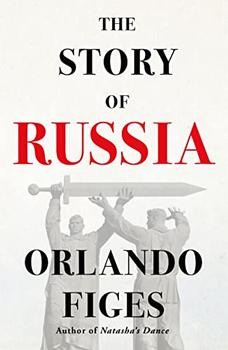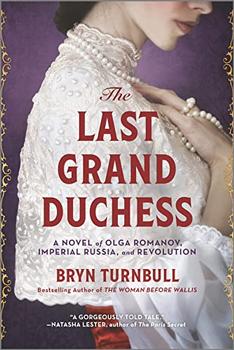Summary | Excerpt | Reviews | Beyond the book | Read-Alikes | Genres & Themes | Author Bio

1613-1918
by Simon Sebag MontefioreThe Romanovs chronicles the reigns of the 20 individuals who were considered members of that dynasty. In addition to being a fascinating biography of each of the men and women who ruled over the empire, it is also, according to the author, "a portrait of absolutism in Russia" and explores "the distorting effect of absolute power on personality."
In its heyday the Russian Empire was remarkable for its territorial growth. Between the ascension of the first Romanov tsar Michael I in 1619 through the abolishment of the monarchy in 1917, Russia grew by an estimated average of 55 square miles per day. Ruling over such an extensive and diverse area required vast power, and yet many of its monarchs were frivolous, capricious, and in some instances probably insane. Tsar Alexei, for example, insisted his boyars (members of the aristocracy) attend dawn church services, and if they failed to appear on time he "had them collected with hands bound behind their backs and, wearing their robes, tossed into the river where they might easily have drowned or died of the cold." Anna I (1693-1740) "arranged female hair-pulling fights between crippled crones that had to draw blood," and Emperor Paul (1754-1801) punished those who kneeled before him improperly (the knee had to make the sound of a rifle butt as it hit the floor).
Politics was a lethal game in Russia – literally. Those who had power and then lost it were most likely to lose their lives as well. Montefiore's writing is at its best as he deftly conveys this delicate dance, showing how both monarchs and those who sought to manipulate them connived to undo those they distrusted. No one was safe; Peter the Great tortured his son and heir Alexander to death because Alexander didn't support his policies. Others rose in imperial influence and esteem rapidly, only to be murdered or exiled as court paranoia mounted. Alexander Menshikov (1673-1729) was a favorite of Peter the Great, eventually becoming governor of Peter's capital, St. Petersburg. But Menshikov was banished to Siberia by a young Peter II, who suspected the statesman of devious power-plays.
The intrigue, scandal and violence that were part of everyday life for members of the imperial court make salacious reading. I'm somewhat amazed no one's yet made a mini-series about the dynasty; they were much more ruthless than the Tudors and the ruling family was in power for more generations than the Caesars (a family to which I was constantly comparing the Romanovs). Reading about the extensive political maneuvering and manipulation called to mind The Game of Thrones – on steroids. If it weren't so well documented one would think the tsars and their minions were products of a disturbed imagination.
Montefiore's writing style is quite engaging and he keeps the pace moving at a brisk clip; although the book is nearly 800 pages without the endnotes, it's not difficult reading. He resists the urge made so popular by many narrative nonfiction authors to speculate on dialog and a subject's motives. Instead Montefiore clearly indicates when he's adding his own opinions and relies primarily on written materials. One can't help but be impressed by the amount of research that went into the book. The author quotes liberally from reams of letters and official documents, a few of which have only recently been released to the public by Russian authorities.
On 9 July, Baltaci surrounded Peter [the Great], who built a deep pit protected by a circle of carts to shelter [his wife] Catherine with her ladies from sun and missiles: there the tsarina waited serenely as the battle raged and her ladies sobbed loudly. The elite Ottoman janissaries attacked; Peter's Moldavian allies were useless but his artillery proved its worth. "Lord God emboldened our men to the extent that though they outnumbered us by 100,000 they were constantly beaten back" until they were in a standoff. Peter called this "a banquet of death." He faced death or capture: he is said to have written to the Senate to say that, if he was indeed seized, they should "cease to regard me as your tsar" and should choose "the most worthy" successor.
The Romanovs suffers somewhat from a problem of scope. The author concentrates chiefly on the personalities of each tsar and tsarina and the politics that swirled around them, making the book much more a series of biographical sketches than a history book; as a result it reads more like an overview than an in-depth exploration of any single ruler or age.
In addition, war was a near constant presence for Russia, but not enough is included about the battles or about Russia's relationships with other nations, and what is covered is so brief and matter-of-fact that I found these sections to be somewhat dull, particularly in the first half. There is virtually nothing about the history beyond the tsar's immediate sphere, and so there is almost no context against which to place the various rulers' lifetimes. The book is already a doorstopper so it wouldn't have been practical to include these details; consequently I think the topic may have been better served by dividing the book into multiple volumes, thereby having the room to dive deeper into peripheral influences.
This criticism aside, The Romanovs is an excellent introduction to Russian history, particularly for those interested in biographies. All the insanity, back-stabbing and sordid affairs make entertaining reading. The book will certainly appeal to Montefiore's fans, and it is, in my opinion, his best work to-date.
![]() This review was originally published in The BookBrowse Review in July 2016, and has been updated for the
May 2017 edition.
Click here to go to this issue.
This review was originally published in The BookBrowse Review in July 2016, and has been updated for the
May 2017 edition.
Click here to go to this issue.

If you liked The Romanovs, try these:

by Orlando Figes
Published 2023
From "the great storyteller of Russian history" (Financial Times), a brilliant account of the national mythologies and imperial ideologies that have shaped Russia's past and politics - essential reading for understanding the country today.

by Bryn Turnbull
Published 2022
This sweeping novel takes readers behind palace walls to see the end of Imperial Russia through the eyes of Olga Nikolaevna Romanov, the first daughter of the last tsar.
Your guide toexceptional books
BookBrowse seeks out and recommends the best in contemporary fiction and nonfiction—books that not only engage and entertain but also deepen our understanding of ourselves and the world around us.